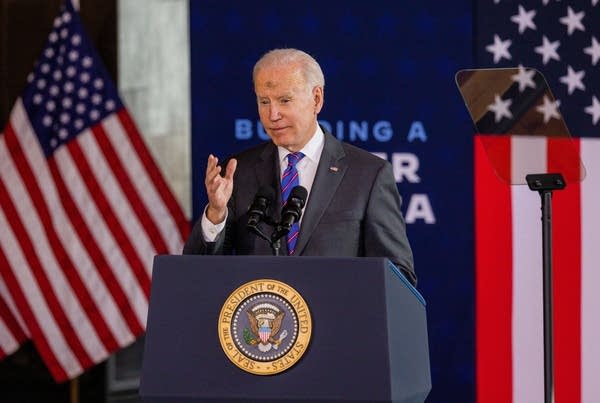Biden touts new money for bridge, road repair in Superior speech

Go Deeper.
Create an account or log in to save stories.
Like this?
Thanks for liking this story! We have added it to a list of your favorite stories.
Updated 5 p.m.
One day after delivering his first State of the Union address, President Joe Biden traveled to the Twin Ports Wednesday to talk about the expected impact of his $1.2 trillion infrastructure spending package on Minnesota, Wisconsin and the nation.
Calling the legislation “the most sweeping investment to rebuild America in history," Biden noted there were hundreds of bridges and thousands of miles of roadway that needed repair across Minnesota and Wisconsin.
“This is the United States of America for God’s sake,” he told an invitation-only crowd at the University of Wisconsin-Superior. “Now, after years of talking about infrastructure, we’re finally getting it done.”
Along with first lady Jill Biden, the president shook hands with workers in hard hats and neon vests near the base of the John A. Blatnik Memorial Bridge, which connects Wisconsin and Minnesota by spanning a corner of Lake Superior. The span is a perennial candidate for replacement because it's too corroded to support heavy trucks, limiting its ability to serve as an economic lifeline for the region.
Turn Up Your Support
MPR News helps you turn down the noise and build shared understanding. Turn up your support for this public resource and keep trusted journalism accessible to all.
Based on formula funding in the law, he said Minnesota and Wisconsin are in line for about $10 billion to invest in roads and bridges. Both states have already pledged to use some of that money to replace the 61-year-old Blatnik Bridge, which connects Duluth and Superior.
The law also includes $1 billion help accelerate the cleanup of dozens of polluted sites around the Great Lakes, including the St. Louis River estuary between the two cities. The cleanup of legacy pollution in the river from old sawmills, a steel mill and other industry is expected to be completed by 2030.
There’s also some funding for the Duluth-Superior port, an important hub for shipping iron ore from Minnesota mines to steel mills in the lower Great Lakes.
Although the $1 trillion infrastructure legislation was a bright spot in his rocky first year, Biden's broader agenda — including education programs, price controls for prescription drugs and financial incentives for fighting climate change — remains stalled on Capitol Hill.

Biden also used Wednesday’s visit to stress the importance of growing manufacturing in this country, including a push to build more electric vehicles. He also said a top priority is to get control of the recent surge in inflation that’s left many families struggling with higher costs.
Prior to Biden’s speech, Minnesota GOP U.S. House Rep. Pete Stauber accused the president of being responsible for high inflation. Stauber, who represents northeastern Minnesota, also faulted Biden for canceling leases for a proposed copper mine near the Boundary Waters.
Watch President Biden’s address on infrastructure Wednesday at the University of Wisconsin-Superior:
Biden’s trip was part of a customary post-State of the Union blitz that enlisted Vice President Kamala Harris and Cabinet officials, who fanned out across the country to showcase the administration's plans.
Other trips highlighted a mix of administration successes and pending proposals.
Harris was in North Carolina, a swing state that remained out of reach for Democrats in the last election, to visit an apprentice training program for union electrical workers. She was joined by Labor Secretary Marty Walsh, one of several Cabinet officials who were traveling Wednesday.
One of the most notable trips was made by Treasury Secretary Janet Yellen, who rarely makes appearances with political undertones. She touched down in Chicago, where she had lunch at a Ukrainian restaurant in a show of solidarity with the besieged country and spoke at the University of Illinois' campus in the city.
Yellen defended the administration's economic sanctions on Russia, saying they've driven down the worth of the ruble and forced Moscow to close the stock market for days to limit losses.
“The objective is to keep the pain to the maximum extent possible, focused on Russia and not on the rest of us,” she said, an acknowledgement that economic ripple effects could affect Americans with higher gas prices.
Environmental Protection Agency Administrator Michael Regan planned to promote investments in water infrastructure during a visit to South Carolina, while Interior Secretary Deb Haaland was headed to Connecticut to talk about funding for tribal communities to expand broadband internet access and repair roads.
Energy Secretary Jennifer Granholm was going to Kentucky to tour a solar farm and participate in a roundtable discussion about clean energy investments across Appalachia.
Biden's approval ratings have sagged since last summer, and Republicans are poised to retake control of Congress. The White House has said Biden intends to spend more time traveling this year to promote his administration's plans.
Dear reader,
Political debates with family or friends can get heated. But what if there was a way to handle them better?
You can learn how to have civil political conversations with our new e-book!
Download our free e-book, Talking Sense: Have Hard Political Conversations, Better, and learn how to talk without the tension.






